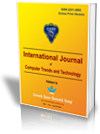Overseeing Cross-Cultural Issues in Global Software Outsourcing

MLA Style: Chandralekha Gopalakrishnan and Mohammed Nazeh Abdulwahid "Overseeing Cross-Cultural Issues in Global Software Outsourcing" International Journal of Computer Trends and Technology 61.3 (2018):122-125.
APA Style:Chandralekha Gopalakrishnan and Mohammed Nazeh Abdulwahid (2018). Overseeing Cross-Cultural Issues in Global Software Outsourcing International Journal of Computer Trends and Technology, 61(3),122-125
Abstract
IT outsourcing keeps on being a blasting business. The reasons why organizations outsource have been all around recorded, including lessened cost, enhanced execution, and access to more extensive work markets.[1],[2] One part of IT outsourcing is the outsourcing of software production. An essential pattern that began in the 1990s and keeps on expanding today is to outsource software production globally[3]. A great part of the product development happens at offshore areas, where costs are low and work is frequently copious. Software providers regularly keep up little bridgehead groups in the customer countries for deals and client contact purposes. Outsourcers thus frequently find officials in the provider countries to, for instance, administer large tasks.
Reference
[1] J.Barthélemy, The hidden costs of IT outsourcing. MIT Sloan Management, Spring 2001.
[2] A.DiRomualdo, and V. Gurbaxani, Strategic intent for IT outsourcing, Sloan Management Review, 1998.
[3] M.Lacity and L. Willcocks, Global Information Technology Outsourcing., 2001.
[4] J.Brannen and J. Salk, Partnering across borders: Negotiating organizational culture in a German-Japan joint venture. Human Relations, 2000.
[5] B.Nicholson and S. Sahay, Some political and cultural issues in the globalisation of software development, 2001.
[6] R.Heeks, S. Krishna, B. Nicholson and S. Sahay, Synching or sinking: Global software outsourcing relationships, 2001.
[7] A.M.Gopal, The role of software processes and communication in offshore software development, April 2002.
[8] B.Nicholson, S. Sahay and S. Krishna, Work practices and local improvisations with global software teams: A case study of a UK subsidiary in India, 2000.
[9] N.Forster, Expatriates and the impact of cross-cultural training., 2000.
[10] A.Khare, Japanese and Indian work patterns: A study of contrasts, 1999.
[11] E.Carmel, Global Software Teams. Prentice-Hall, New Jersey, 1999.
[12] G.Walsham, Making a World of Difference: IT in a Global Context., 2001.
Keywords
Outsourced software, offshore, global production, cross-cultural, telecommunication, e-business,


